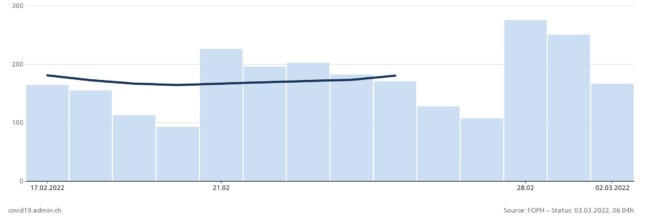After reaching the peak in January, then falling and stabilising for a while — prompting the Federal Council to scrap nearly all health measures from February 17th — the number of new infections in on the rise again.
From just over 16,000 cases in the third week of February, the number jumped to more than 18,000 seven days ago, and to 25,131 additional cases on Friday — an increase of over 31 percent in one week, according to data from the Federal Office of Public Health (FOPH).

While this increase may be disappointing for all those who are hoping the Federal Council will lift remaining Covid rules — masks on public transportation and in health establishments, as well isolation obligation for infected individuals — from the end of the month, this epidemiological evolution was predictable.
In the very least, “it is not a surprise”, Didier Pittet, head of the infection prevention service at Geneva’s University Hospitals (HUG), said in an interview with RTS public broadcaster on Friday.
That’s because “we know that Omicron is extremely contagious”, he said, noting that this variant now accounts for 99.7 percent of all Covid cases in Switzerland.
“The impact of contamination is currently commonplace. We relaxed the measures, we expected that there would be transmission”.
While the virus “is problematic for unvaccinated people,” the fact that number of infections is climbing “is not necessarily bad news because these contaminations contribute to building our immunity”, Pittet pointed out.
While those who have not had their vaccines may have a more severe course of the disease, others “will have small colds and headaches. It’s not too serious. We probably have to go through this stage so that immunity grows and next fall we are better armed for the very likely return of this virus”, he said.
The only way this spike in infections would cause alarm is if the number of Covid patients suddenly increased in Swiss hospitals, leading to eventual saturation of ICUs.
So far, this does not seem to be the case, though more Covid admissions have been registered in one week: from 127 on February 28th to 138 on March 2nd. As a comparison, 306 ICU beds were occupied by coronavirus patients at the beginning of January.
READ MORE: Why did Switzerland relax Covid measures?



 Please whitelist us to continue reading.
Please whitelist us to continue reading.
Member comments